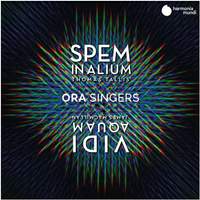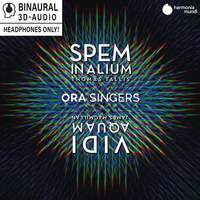Recording of the Week,
Tallis, MacMillan and more from ORA Singers
Listening to today’s Recording of the Week was at once a breath of fresh air and a bittersweet reminder of how long it has been since live performances were suspended. Thomas Tallis’s monumental forty-part motet Spem in alium, around which vocal ensemble ORA’s new album is based, is the ne plus ultra of Renaissance choral music and inherently requires an unusually large number of singers to gather in one place as a supersized consort. Its sheer size makes it a challenging work, but an infinitely rewarding one that performers never seem to tire of.
 ORA’s previous albums have seen them pair well-known early choral works with newly-commissioned ‘reflections’ by contemporary composers, and this theme continues here, with Spem in alium counterbalanced by a new forty-part work by James MacMillan. Vidi aquam, a setting of Ezekiel’s vision of the renewed Temple, is a true masterpiece, making innovative use of the textural and spatial options that a forty-part choir offers. It shares some characteristics with the Tallis – the use of majestic tuttis to accentuate dramatic points in the text, for instance – though is by no means a mere imitation. MacMillan’s trademark vocal flourishes are here in abundance, enlivening the sonic tapestry and, together with some evocative harmonies, helping to ratchet up the feeling from the stately grandeur of Spem in alium to something bordering on the rapturous.
ORA’s previous albums have seen them pair well-known early choral works with newly-commissioned ‘reflections’ by contemporary composers, and this theme continues here, with Spem in alium counterbalanced by a new forty-part work by James MacMillan. Vidi aquam, a setting of Ezekiel’s vision of the renewed Temple, is a true masterpiece, making innovative use of the textural and spatial options that a forty-part choir offers. It shares some characteristics with the Tallis – the use of majestic tuttis to accentuate dramatic points in the text, for instance – though is by no means a mere imitation. MacMillan’s trademark vocal flourishes are here in abundance, enlivening the sonic tapestry and, together with some evocative harmonies, helping to ratchet up the feeling from the stately grandeur of Spem in alium to something bordering on the rapturous.
Without the polished tones of the ORA Singers – a core of eight supplemented by additional singers for the larger works – this luminous, ecstatic sound would be impossible. The sopranos are particularly impressive; MacMillan’s soprano lines frequently reach for the stratosphere but ORA give no sense that they present any difficulty. The group’s ensemble, too, remains flawless even during the music’s busiest moments – testament to Suzi Digby’s skill in directing them from within the large circle into which they are arranged.
Lying between these two vast, contrasting choral monoliths is a varied selection of Tudor pieces all thought to have originated from a similar source to Spem in alium - commissioned in connection with Surrey’s great Nonsuch Palace, whose octagonal towers are believed to have been a factor in Tallis’s choice to write for eight five-voice choirs. For these works, born from royal and aristocratic patronage, we return to a conventional consort sound, allowing ORA’s singers to shine as individuals while showcasing some rarely-heard works.
 Several Continental composers worked in England during this time, including the Flemings Philip van Wilder and Derrick Gerarde and the Italian Alfonso Ferrabosco (who carried on an exciting second career as an international intelligence agent, using music as a cover for diplomatic skulduggery). Their works are well represented here; the contrast between Gerarde’s French-language motet O Souverain Pasteur and his Tallis-esque Tua est potentia highlights the richness of the web of cross-Channel musical exchanges, and a modest but very effective Lord’s Prayer by Philip van Wilder is a particular joy. Also present, naturally, is Tallis’s contemporary William Byrd, whose haunting Domine, salva nos is another highlight. ORA’s mesmerisingly poised rendition stands out, even among the other treasures on this album – though my favourite moment of all is probably the opening of Tallis’s own In ieiunio et fletu, where the singers perfectly capture the stillness and desolation of the text.
Several Continental composers worked in England during this time, including the Flemings Philip van Wilder and Derrick Gerarde and the Italian Alfonso Ferrabosco (who carried on an exciting second career as an international intelligence agent, using music as a cover for diplomatic skulduggery). Their works are well represented here; the contrast between Gerarde’s French-language motet O Souverain Pasteur and his Tallis-esque Tua est potentia highlights the richness of the web of cross-Channel musical exchanges, and a modest but very effective Lord’s Prayer by Philip van Wilder is a particular joy. Also present, naturally, is Tallis’s contemporary William Byrd, whose haunting Domine, salva nos is another highlight. ORA’s mesmerisingly poised rendition stands out, even among the other treasures on this album – though my favourite moment of all is probably the opening of Tallis’s own In ieiunio et fletu, where the singers perfectly capture the stillness and desolation of the text.
The penultimate work, van Wilder’s Vidi civitatem, neatly sets up MacMillan’s with a slightly different prophetic vision – this one from St John’s Revelation, but with similar themes of longed-for renewal, and with ear-catching word-painting of the new Jerusalem “descending from Heaven”.
It’s easy to be distracted by the two forty-part motets on this album, and it’s undeniable that they are both great works, masterfully performed. Vidi aquam is a magnificent addition to the small but select pantheon of pieces written to complement Spem in alium, though it certainly doesn’t need to lean on Tallis’s work to justify its existence. It would be a mistake, though, to overlook the substantial filling that lies in the middle of the sandwich; in selecting composers associated with Nonsuch Palace, ORA are doing much more than just picking and mixing. The palace itself was conceived as an exuberantly international architectural fusion demonstrating England’s artistic prowess, and the works they perform here mirror it perfectly in music.
ORA Singers, Suzi Digby
Available Format: CD + DVD Video
ORA Singers, Suzi Digby
Available Formats: MP3, FLAC, Hi-Res FLAC
ORA Singers, Suzi Digby
Available Formats: MP3, FLAC, Hi-Res FLAC





